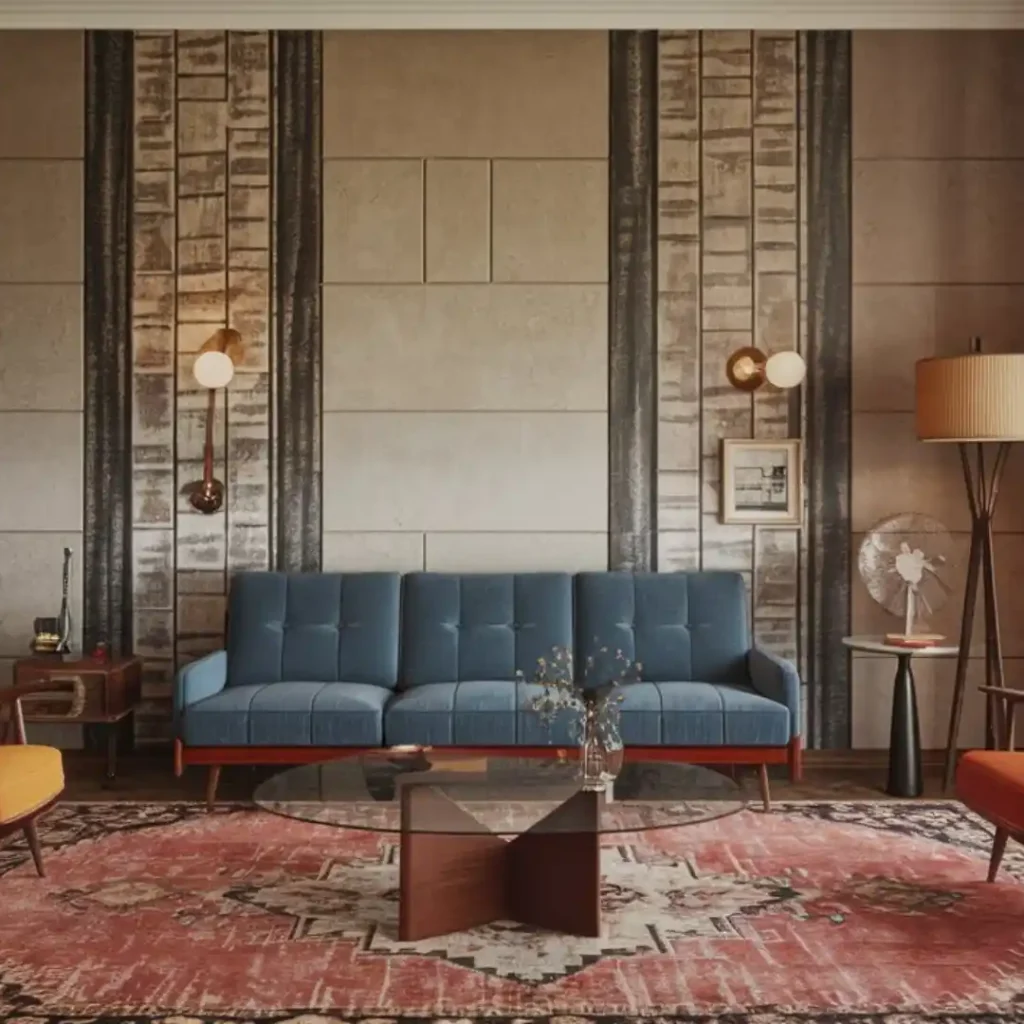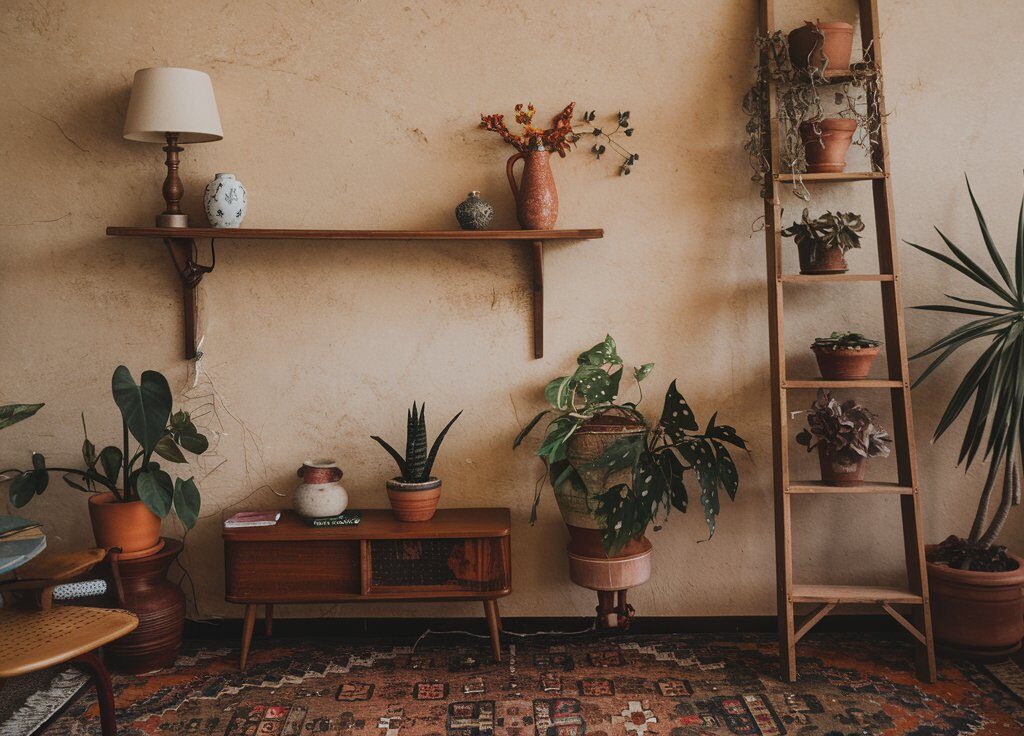Vintage and modern interior design celebrates the elegance of the past while combining it with the simplicity and functionality of today. This design style combines nostalgic, vintage, or mid-century elements with clean, modern lines. The result is a blend that appeals to both classic and modern tastes. The rise of vintage modern design lets homeowners add character and history to their spaces. They can do this without losing today’s comforts and conveniences.
At its core, vintage and modern interior design respects the charm of historical decor while reinventing it to meet today’s aesthetic standards. This style adds a personal touch to any space. It uses curated antiques, subtle retro accents, and modern takes on vintage decor. It offers a fresh take on timeless beauty.
The Appeal of Vintage and Modern Interior Design
So, why has vintage and modern interior design become such a beloved trend? The solution resides in its adaptability and appeal. This style captures the warmth and nostalgia associated with vintage aesthetics, while also incorporating modern conveniences that cater to today’s lifestyle. People are increasingly drawn to spaces that feel inviting and layered with stories. Vintage elements provide a sense of history, and when blended with modern pieces, the look becomes both sophisticated and relaxed.
This balance also allows for endless customization. You don’t have to stick strictly to one decade or design rule. Instead, you can mix different periods, patterns, and materials that align with your personality. In many ways, vintage and modern interior design celebrates the eclectic and unique, inviting people to create spaces that feel truly personal.

Key Principles of Vintage and Modern Interior Design
Achieving the ideal vintage and modern interior design look requires a thoughtful approach to blending old and new. The key lies in creating a seamless transition between the two styles, so they complement rather than compete. Start by choosing foundational pieces that anchor the space—such as a vintage dining table or a modern sectional sofa. The rest of the decor should revolve around these focal pieces, enhancing their presence without overwhelming them.
Another principle is to curate with intention. Not every item has to be vintage or modern; instead, select pieces that resonate with each other in tone, color, or material. Whether it’s a mix of velvet and leather or wood and metal, a well-balanced combination of textures and styles can create harmony. Aim for cohesion over uniformity, as this balance is what brings the vintage modern style to life.
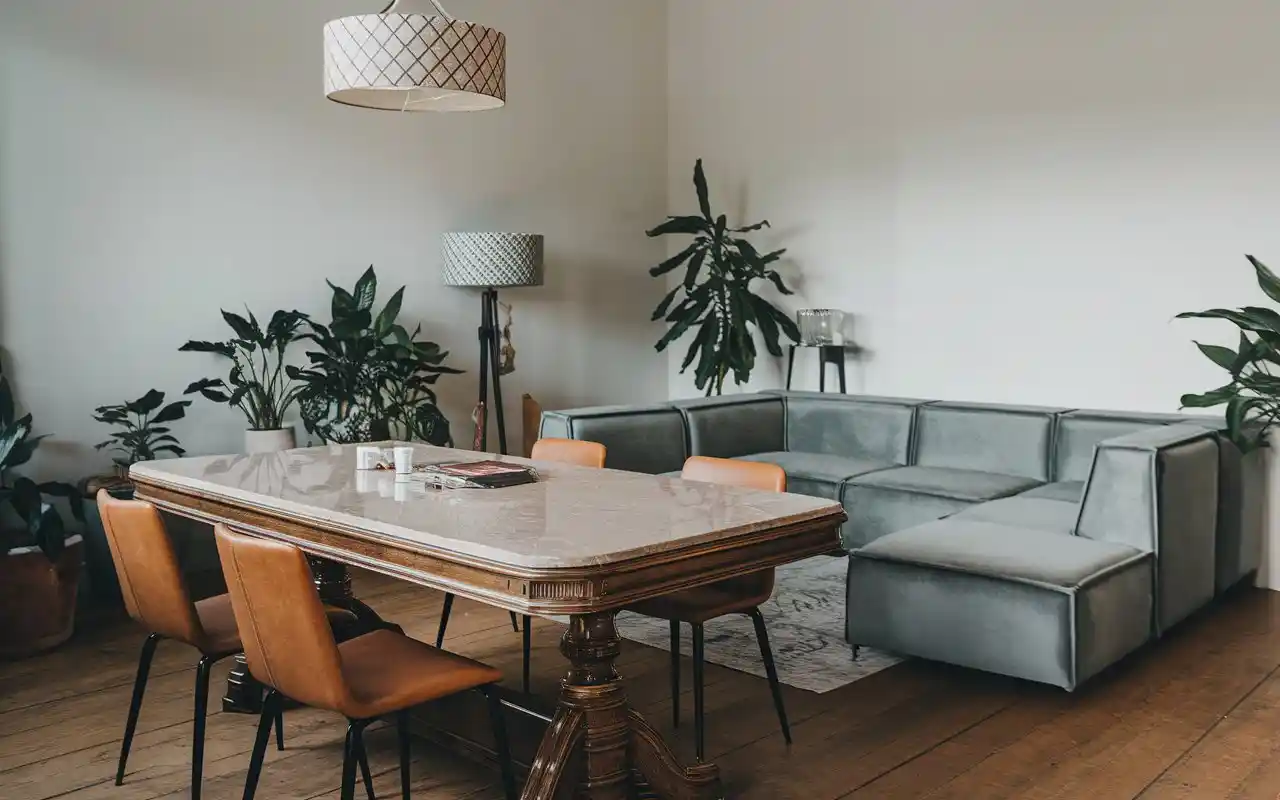
Selecting Vintage Pieces That Enhance Modern Spaces
Finding the right vintage pieces is crucial to achieving a great vintage and modern interior design. Authenticity matters, so look for high-quality vintage items that enhance the space without making it feel cluttered. Think of pieces like a mid-century armchair, a vintage coffee table, or a classic armoire with character. These items serve as conversation starters, adding a touch of history and charm to any room.
When selecting vintage furniture, keep functionality in mind. Choose items that are not only beautiful but also practical for everyday use. For instance, a retro credenza can serve as storage while adding character to a living room. The key is to integrate pieces that enhance the space’s overall appeal without overwhelming it. A few carefully chosen vintage items can make a big impact, adding depth and personality to the room.

Incorporating Modern Elements in Vintage Spaces
Incorporating modern elements into a vintage-inspired room can prevent the space from feeling too dated. By adding contemporary furniture or decor, you can bring a sense of freshness to the room. For example, a modern, minimalist sofa paired with a vintage coffee table can create a striking contrast that feels both stylish and balanced. Additionally, modern artwork, sleek light fixtures, or a contemporary rug can help ground the space.
Mixing materials like glass, metal, and wood can also add a layered, multidimensional feel. This blend of textures highlights the interplay between old and new, creating a cohesive design that’s visually interesting and functional. By carefully balancing these elements, you can achieve a vintage and modern interior design that feels both timeless and on-trend.
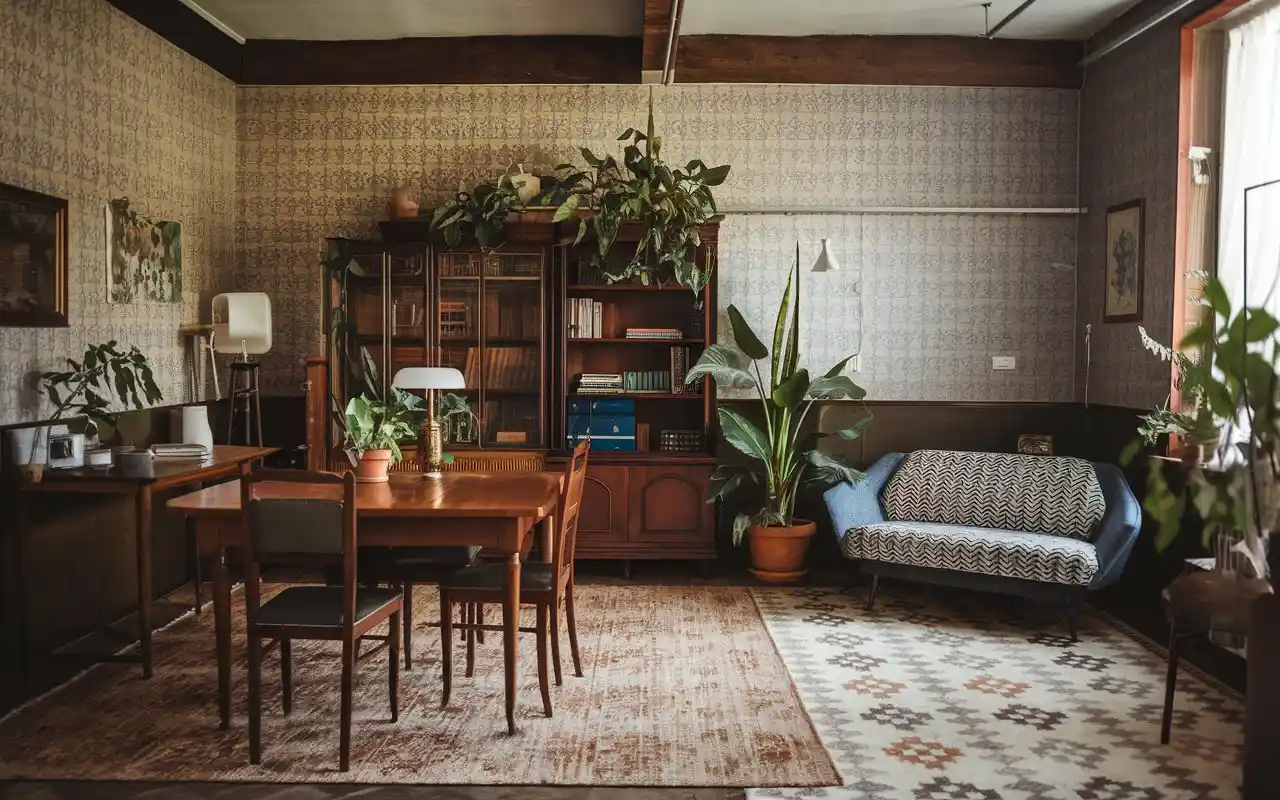
Color Schemes in Vintage and Modern Interior Design
Color plays a crucial role in creating the vintage and modern interior design look. Neutral tones like beige, gray, and soft white create a versatile background that lets vintage pieces take center stage. To add warmth and depth, use colors like mustard yellow, deep teal, or olive green. They add a nostalgic touch without overwhelming the room.
A common approach is to stick to a base of neutral colors and then layer in richer tones for contrast. For example, pair a cream sofa with jewel-toned pillows, or add a pop of color with a vintage-inspired rug. Natural textures, such as wood or leather, further enrich the palette, adding a rustic touch that complements the overall aesthetic. These color choices help evoke a sense of timeless elegance and make the space feel cohesive.

Using Texture to Enhance Vintage Modern Interiors
Texture plays a crucial role in vintage and modern interior design, as it adds depth and visual interest to a room, creating a tactile experience that makes the space feel welcoming and inviting. Leather chairs, wooden tables, woven rugs, and plush fabrics are all excellent choices for bringing texture into the room. For instance, pairing a sleek, modern metal lamp with a distressed leather armchair creates an intriguing contrast that is visually appealing.
Layering textures helps balance the space by adding warmth to the clean lines of modern elements. Think of combining a velvet couch with a rustic wooden coffee table or placing a woven basket next to a sleek metal bookshelf. These contrasts create a rich, dynamic feel that enhances the vintage modern aesthetic, making the space feel well-curated and comfortable.

Lighting Tips for Vintage Modern Homes
Lighting is essential in setting the mood for any interior style, and vintage modern interiors are no exception. The right lighting can highlight vintage pieces while creating an inviting atmosphere. Consider using pendant lamps, industrial-style lights, or even classic chandeliers to bring warmth to the room. Wall sconces or Edison bulbs are also popular choices that can add a subtle vintage touch.
Incorporate a mix of lighting sources, including natural light, to achieve a well-balanced look. For example, combine a statement pendant light over the dining table with smaller table lamps or floor lamps in the living area. This layering approach helps balance light throughout the room, creating a welcoming ambiance that complements the vintage and modern interior design.
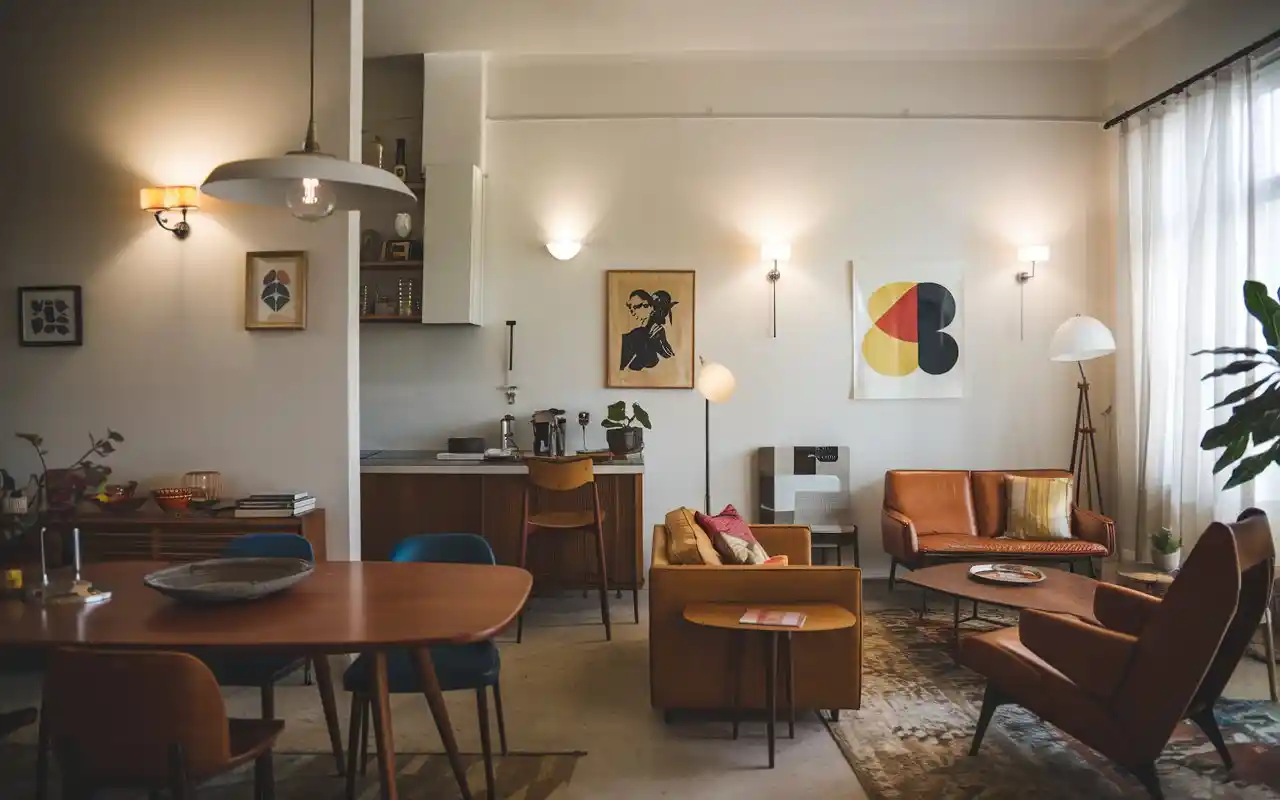
Popular Vintage Styles for a Modern Home
Several vintage styles work particularly well within the vintage and modern interior design framework. Mid-century modern is one of the most popular, characterized by clean lines, functional forms, and natural materials. Art Deco, known for its bold geometric patterns and luxurious finishes, can also add a touch of glamour to modern spaces. Choosing a specific vintage style gives your space a cohesive direction and allows you to build around a theme.
You don’t have to stick strictly to one style; mixing elements from different periods can add depth and variety. For example, pairing mid-century modern furniture with Art Deco accents can create a rich, eclectic, and harmonious space. This flexibility is one of the reasons why vintage and modern interior design remains so popular.
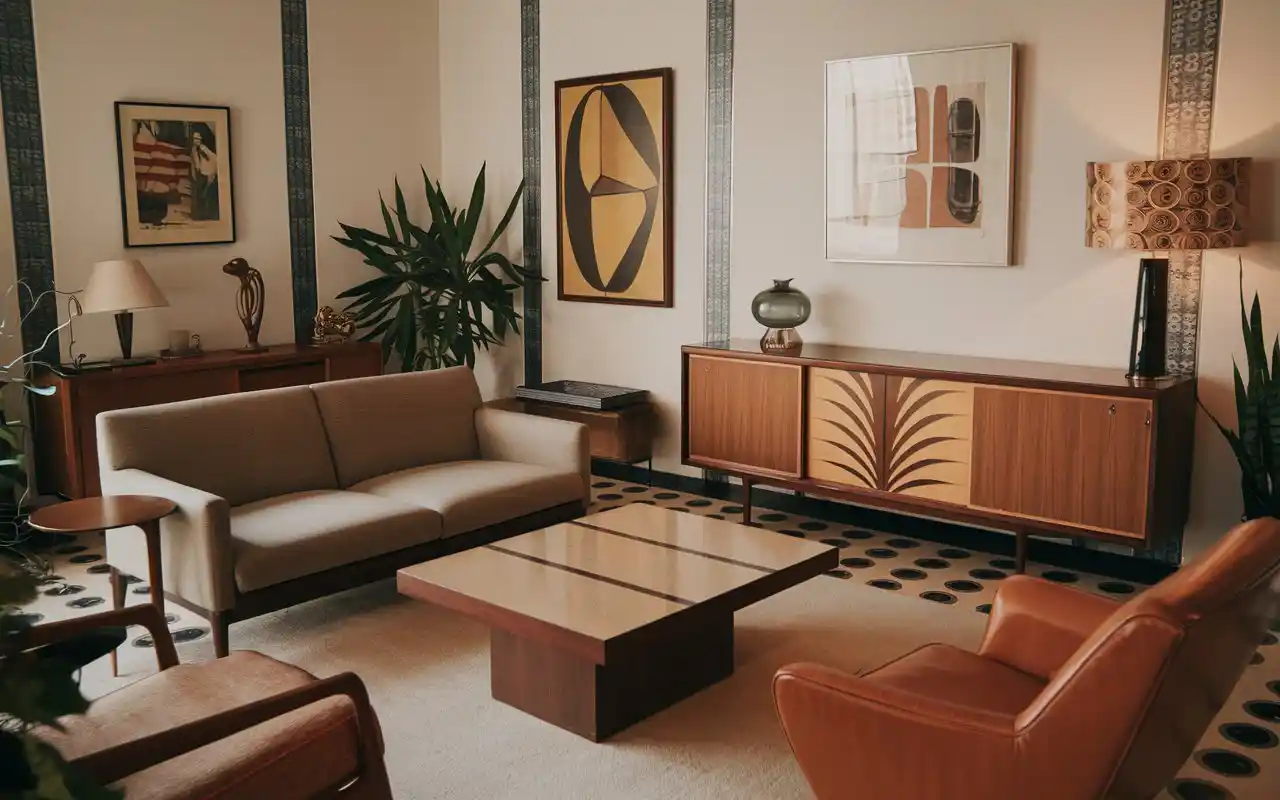
Creating Balance Between Functionality and Aesthetics
In vintage and modern interior design, balancing functionality and aesthetics is essential. While vintage pieces bring charm and character, they should also serve a practical purpose in your daily life. For example, a beautiful antique cabinet can also serve as storage, while a retro chair should be comfortable for lounging. This blend of form and function makes your space both stylish and livable.
When choosing furniture and decor, ask yourself if the piece adds value beyond its aesthetic appeal. A vintage coffee table with a sturdy design is ideal for daily use. A delicate, purely decorative piece is better as an accent. By focusing on both beauty and utility, you can create a space that is both visually stunning and practical.
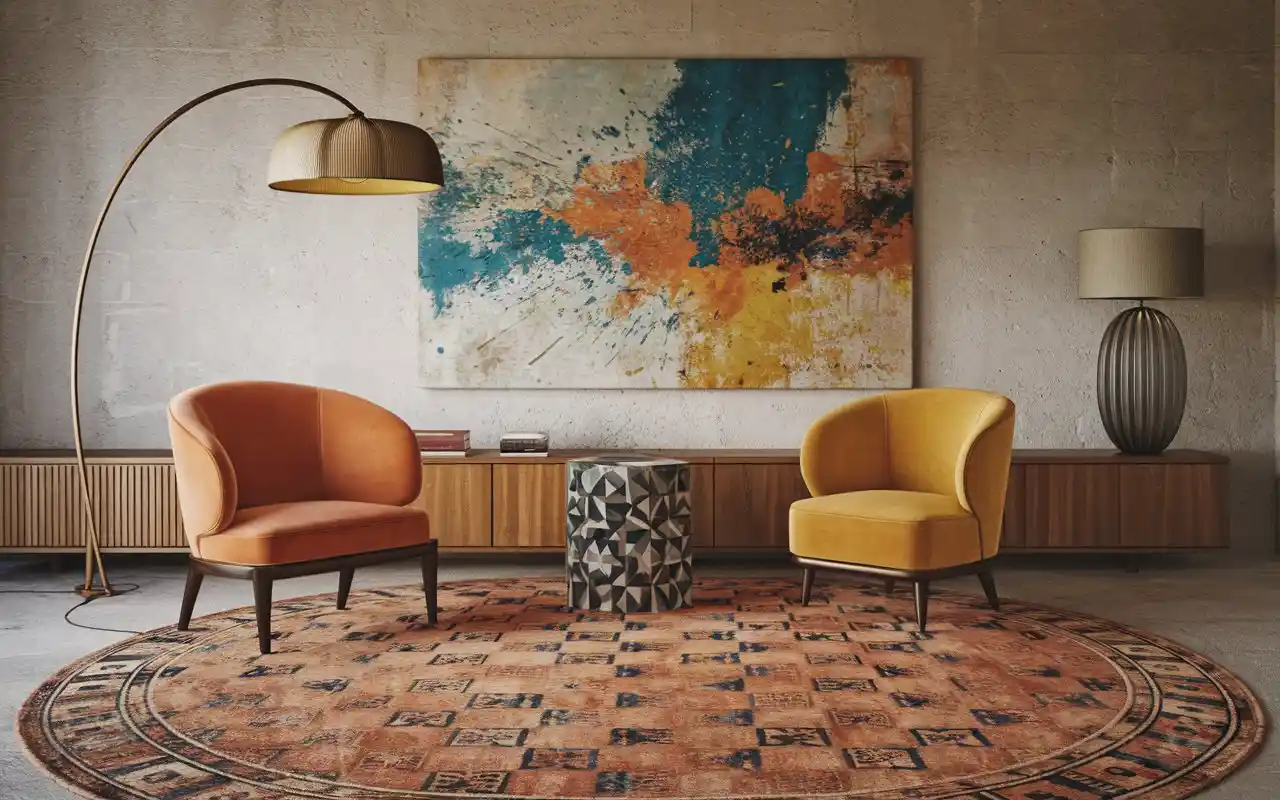
Accessorizing with Vintage Modern Decor
Accessories are the finishing touches that bring your space together. In vintage and modern interior design, the right decor can enhance the overall aesthetic without cluttering the room. Look for pieces that add a touch of personality, like vintage artwork, a classic mirror, or a few well-chosen antiques. These items don’t need to be large or numerous; sometimes, a few thoughtfully placed pieces can make a big impact.
Consider balancing vintage accessories with modern decor to avoid a museum-like feel. For example, pair a vintage clock with contemporary vases or add a classic painting alongside minimalist sculptures. These combinations create a layered look that feels curated and personal, enhancing the vintage modern vibe without overwhelming the space.

DIY Vintage Modern Upcycling Ideas
Upcycling is a fantastic way to bring vintage and modern interior design into your home without breaking the bank. Not only does it allow you to create one-of-a-kind pieces, but it’s also an environmentally friendly approach that minimizes waste. Transforming an old item into something new, with a touch of modern style, is easier than you might think. For example, an old dresser can be repainted with a matte finish to give it a modern twist, while a worn-out chair can be reupholstered in a contemporary fabric.
Consider mixing and matching elements, like adding new hardware to vintage cabinets or repurposing old wooden doors as wall decor. This approach brings a unique character to your home and reflects a personal touch that can’t be achieved by simply buying new furniture. Upcycling is also a sustainable choice, making it perfect for those who appreciate vintage aesthetics and want to live a more eco-conscious lifestyle.

Finding Inspiration for Vintage Modern Design
The world of vintage and modern interior design is vast, and finding inspiration can be incredibly rewarding. Online platforms such as Pinterest, Instagram, and home design blogs are full of creative ideas to get you started. There, you’ll find everything from curated vintage-modern living rooms to retro-inspired kitchens that capture the spirit of the style. Also, interior design magazines and websites often feature real homes. They have masterfully blended vintage and modern elements. They provide practical ideas.
Consider joining design communities or following influencers who specialize in vintage modern decor. Their insights, combined with your creativity, can inspire you to create a space that’s entirely your own. Whether it’s finding the perfect color palette, selecting vintage furniture, or choosing unique decor, inspiration is everywhere. Keep an open mind, explore different sources, and let the process guide you as you create your ideal space.
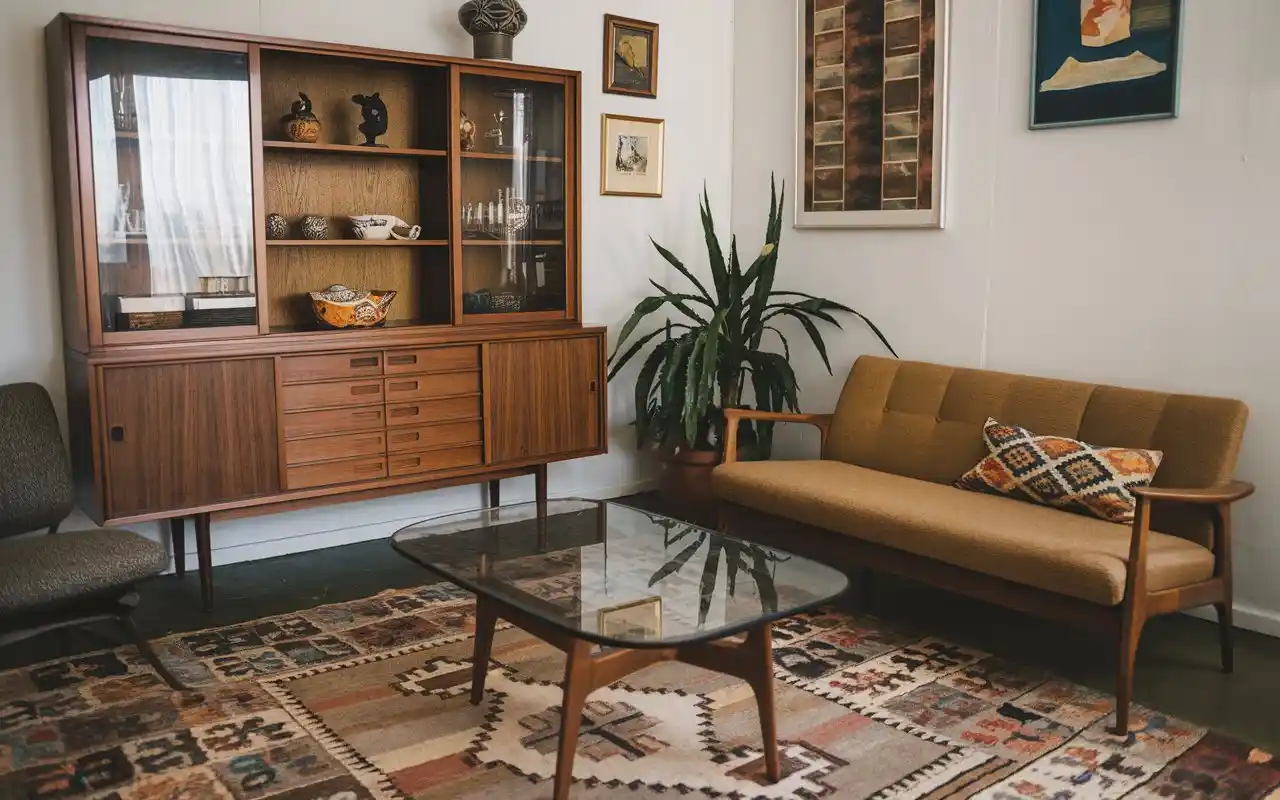
Budget-Friendly Tips for a Vintage Modern Look
Achieving a stunning vintage modern interior doesn’t require an unlimited budget. In fact, some of the best finds come from thrift stores, flea markets, and online marketplaces where vintage pieces are often sold at affordable prices. One way to save is by looking for items that need a little TLC. A coat of paint, new upholstery, or fresh hardware can transform an outdated piece into a statement for your home.
If thrift shopping isn’t for you, consider visiting stores that offer quality reproductions of classic designs. There are many companies today that create new pieces with a vintage-inspired look, often at a fraction of the cost of authentic items. Additionally, you can save by doing DIY projects or upcycling items you already own. With a bit of creativity and resourcefulness, creating a budget-friendly vintage and modern interior design is entirely achievable.
Conclusion
Vintage and modern interior design is a style that combines the best of the past with the conveniences of the present, offering a timeless approach to home decor. By carefully blending vintage pieces with modern elements, this aesthetic creates warm, inviting, and uniquely personal spaces. It’s a versatile design choice that allows for customization and creativity, making it suitable for anyone looking to add character to their home.
Whether you’re drawn to mid-century furniture, enjoy a touch of Art Deco glam, or prefer rustic vintage decor, vintage and modern interior design has something to offer. The key is to create balance, choose pieces that speak to you, and enjoy the process of curating a space that reflects your personality. Embracing this style means celebrating history while appreciating modern aesthetics, resulting in a timeless and contemporary home.

